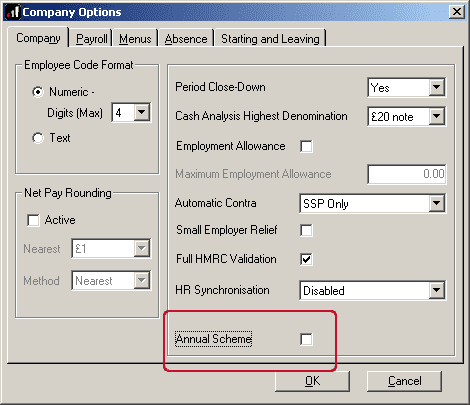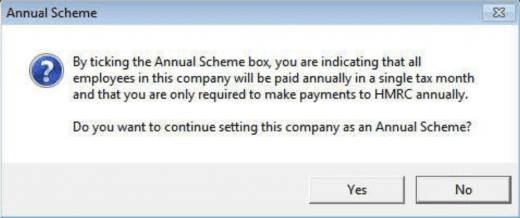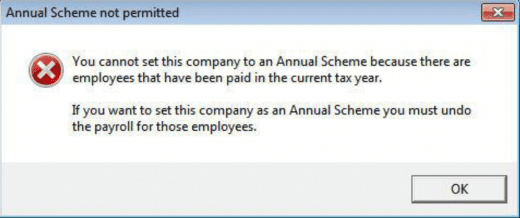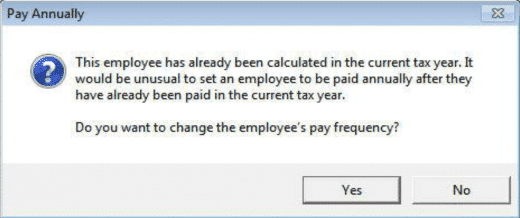Processing Annual Payroll Scheme
Article ID
11161
Article Name
Processing Annual Payroll Scheme
Created Date
6th April 2017
Product
Earnie, IRIS Payroll Professional
Problem
How can I process and annual payroll and still comply with RTI?
Resolution
There now two options for processing a payroll annually, company level (ie ALL employees paid annually) or employee level (ie. just that employee is paid annually)
Company Level
An Annual Scheme indicator is now available in Company Options.
Go to “Company” > “Alter Company Options“:

The Annual Scheme function is designed for a company where all employees are to be paid just once a year, in the same single tax month, and the employer is only required to pay HMRC annually.
With this option ticked, IRIS Payroll Professional / Earnie will use the annual thresholds for Tax and NI when calculating the payroll.
To use this function:
- Go to “Company” > “Alter company options”
- Tick the “Annual Scheme” option
- Click “OK” to save the change
- If you have not yet paid any employees in this tax year, the following message will appear:

- Click “Yes” the “OK” to save the change.
- If you have already paid employees in this company you will see the following message instead:

- You will be unable to set the Annual Scheme indicator if employees in the company have been paid in the current tax year.
- Once the Annual Scheme indicator is set, when running payroll, just select the appropriate pay period as normal. Payroll will use the annual thresholds for the calculations.
NOTE: When pay is annual payroll will not be able to calculate average earnings for statutory payments. When setting up statutory payments you will need to calculate and type in the average earnings manually.
If the PAYE Scheme has been correctly registered with HMRC as an annual scheme there is no requirement for you to send an EPS marked as no employees paid for the other months of the tax year. You will send a single FPS for the period in which the annual payment is made.
If you send more than one FPS in the tax year HMRC will automatically remove the annual payment status from the PAYE scheme and would then expect EPS submissions to inform them of periods of inactivity like any other PAYE scheme.
Employee Level
A Pay Annually indicator is now available in Employee Details.
The Pay Annually function is designed to be used for Pension drawdown, which permits payments to be made to employees in different pay periods, and payments are made to HMRC more than once in the tax year.
To use this function:
- Open the ‘Employee’ menu, click on ‘Select Employee’ and from the list select the relevant employee
- Select the ‘Period’ tab and tick the ‘Pay Annually’ box
- Click ‘Save’
- If the employee has already been paid in the current tax year, this message will appear:

- Click ‘Yes’ to apply the changes or ‘No’ for the Pay Frequency to remain as it was
- Set the ‘Next Tax Pay Period’ to be the pay period you intend to pay the employee
- If you currently don’t know when you are to pay, select ‘Hold’ on the Period tab to prevent them appearing in the payroll.
- At the point you know when they are to be paid, de-select ‘Hold’, set the pay frequency and set the ‘Next Tax Pay Period’ to be the pay period you intend to pay them.
Regardless of the Next Tax Pay Period you select, payroll will still use the annual thresholds to calculate the employee’s pay when Pay Annually is ticked.
We are sorry you did not find this KB article helpful. Please use the box below to let us know how we can improve it.
